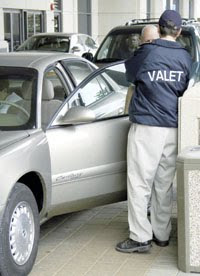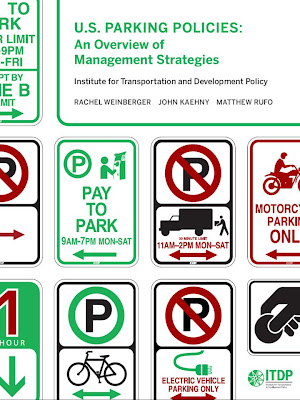Transit agencies across the country are struggling to make ends meet and are being forced to cut service. Too often, their hardship is treated differently from departments of transportation. For example, I often hear that transit is a subsidy, while roads are an investment. Here in Atlanta, the Metropolitan Atlanta Rapid Transit Agency is in especially dire straits, and the state treats it like a red headed stepchild (MARTA is the only major transit agency in the world that does not get state funding).
In today's AJC, Jim Durrett, a MARTA board member, explains that when transit services are cut, transit riders aren't the only victims.
READ THE OP/ED
Friday, March 19, 2010
Thursday, March 11, 2010
Seeing Is Believing
I often think about how the design of a street can eleicit a feeling from those who use it similar to the way a piece of art or architecture elicits a feeling. Unfortunately, most people using a street do not know why they are feeling a certain way. They just know they are.
A recent article that highlights Steve Price's work shows streets transformed from places that create a negative reation to places that create a positive one.
"The work, done mostly with Photoshop, rests on the premise that seeing a proposed development can be more useful to people than receiving lots of information about it. There are limits, says Price, to explaining a design proposal with things like dwelling-units per acre, setbacks, building heights, traffic volumes, and vehicle-miles traveled. They might be perfectly good arguments, he says. They’re just not how people come to understand and support civic changes."
What are your reactions to the changes?
See the article here.
Monday, March 8, 2010
Parking Companies Not Paying Valet Attendants at Least Minimum Wage: Beware
 In the hyper competitive valet industry, the question of whether to pay the employees a minimum wage plus tips, tip wage plus tips, or have the valets work for tips only is always a quandary. At Lanier, we have chosen to take the high legal ground by paying minimum wage plus tips. Of course, this has resulted in Lanier having to pass on many of valet opportunities. But, let the buyer beware. Two recent articles, one in the National Restaurant News and the other in Service First Newsletter, point out that not only is the valet company potentially liable for underpaying the valets, but so too is the entity that hired the valet company.
In the hyper competitive valet industry, the question of whether to pay the employees a minimum wage plus tips, tip wage plus tips, or have the valets work for tips only is always a quandary. At Lanier, we have chosen to take the high legal ground by paying minimum wage plus tips. Of course, this has resulted in Lanier having to pass on many of valet opportunities. But, let the buyer beware. Two recent articles, one in the National Restaurant News and the other in Service First Newsletter, point out that not only is the valet company potentially liable for underpaying the valets, but so too is the entity that hired the valet company. Monday, March 1, 2010
Parking Management key to successful transportation system
 When I left the Perimeter Transportation Coalition (PTC) to come work for Lanier Parking Solutions, many people asked how someone who worked so hard to promote alternative transportation could work for a parking company. I would say that I am a big advocate of paid parking, because it encourages people to think about the cost of driving trips, and as a result they may change their travel behavior (i.e biking, walking, transit, and carpooling). Ninety-nine percent of all U.S. driving trips end in free parking spaces, but when the economic and environmental consequences are considered, these parking spots are not free at all. Smarter parking management, which is what Lanier has touted for the past decade, will benefit consumers and businesses in time and money saved. This has now been confirmed by a recent study by Insitute for Transportation and Development Policy (TTDP).
When I left the Perimeter Transportation Coalition (PTC) to come work for Lanier Parking Solutions, many people asked how someone who worked so hard to promote alternative transportation could work for a parking company. I would say that I am a big advocate of paid parking, because it encourages people to think about the cost of driving trips, and as a result they may change their travel behavior (i.e biking, walking, transit, and carpooling). Ninety-nine percent of all U.S. driving trips end in free parking spaces, but when the economic and environmental consequences are considered, these parking spots are not free at all. Smarter parking management, which is what Lanier has touted for the past decade, will benefit consumers and businesses in time and money saved. This has now been confirmed by a recent study by Insitute for Transportation and Development Policy (TTDP)."U.S. Parking Policies: An Overview of Management Strategies," co written by Professor Rachel Weinberger, John Kaehny, and Matthew Rufo, illustrates how parking management in most U.S. cities creates additional traffic and air pollution and feeds auto dependence. As long as parking is considered independently of transportation policy, parking demand and traffic will continue to increase in the form of excess auto trips, on-street parking shortages, and a decline in the overall pedestrian’s environment. This is not only true from a macro level (region and city) but also from a micro level (mixed use development and retail establishment). Traditional parking policy prioritizes private automobile use, undermining the use of public transit, walking, and bicycling as travel modes, spurring significantly higher household travel costs for all.
A balanced transportation system, with the automobile and parking being one component, is the end game. The parking policy of the past 30 years has been a huge impediment to creating such a system. But as the ITDP study indicates, there seems to be change in the air. Download the full report.
Subscribe to:
Posts (Atom)
